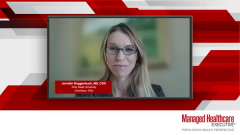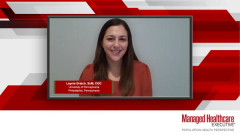
Humanistic Burden Associated with ALS
Key humanistic burdens, including stressors on patients and family members, are highlighted.
Episodes in this series

Jennifer Roggenbuck, MS, LGC: ALS [amyotrophic lateral sclerosis] has a huge impact on the individual who is affected as well as their family members and caregivers. For someone who has ALS, it’s devastating to lose mobility and the ability to walk around. At some point in the disease, most individuals with ALS experience bulbar weakness with difficulty speaking and swallowing. That means that patients with ALS may lose the ability to talk clearly or even at all. They may also lose the ability to chew and swallow their food, and so they may need a feeding tube to get nutrition. It’s a devastating disease. In ALS clinics, we look to manage those symptoms to enhance the quality of life for patients with ALS.
In terms of the impact on family members, they often to provide care to assist individuals in getting around from place to place, with bathing, and in some cases with communication. All of this is very time consuming, and it sometimes requires physical adaptations to the home environment or modes of transportation. It’s a devastating disease. But if there’s a positive side, the slowly progressive nature of ALS means we do have time to intervene and help individuals prepare for those things to enable them to have the best quality of life for the longest period of time.
Genetic testing should be offered at the time of the diagnosis for patients with ALS. The time of diagnosis is a very stressful time for individuals and their families, but genetic testing is important because it has the potential to answer key questions that patients often have. They include, “Why did I get ALS? What can we do about it?” Having that genetic diagnosis can enable research participation in gene-targeted clinical trials, natural history studies, and hopefully soon FDA-approved therapies.
The timing of therapeutic intervention is critical. We know from other gene therapy studies, including SMA, spinal muscular atrophy, that the earlier we begin treatment, the better the outcomes are for the patient. A delay in genetic diagnosis could also mean a delay in the offer of therapy. Even though there’s a lot to talk about at the time of the diagnosis, genetic diagnosis should be 1 of the things on the list. If it’s not at that first diagnostic visit, then it should be at the next 1. We don’t want to delay getting this information to individuals with ALS and their families.
Laynie Dratch, ScM, CGC: The humanistic burden of ALS cannot be understated. It’s extremely variable from patient to patient in terms of what they or their care partners may experience. This disease has a dramatic impact on individuals’ lives. It often strikes when individuals are in their 40s, 50s, and 60s. It might be when they’re at the peak of their career. The symptoms might prevent them from doing the job they love, and that can have a devastating impact on how they identify. When you ask someone, “Who are you? What do you do?” they’ll often respond with their career. It’s a point of passion for many individuals. ALS can disrupt the financial stability of a family. You’re perhaps taking away their ability to get an income and simultaneously throwing in a disease that requires a lot of medical care and is often quite expensive. It requires many trips to physicians for evaluations. That can be disruptive for the career as well. It tends to strike when individuals have children, and it might have a bad impact on the kids, who might be in college or high school. Families have to navigate how they share this.
For care partners, they might have to stop whatever they were doing in their lives to transition into the role of a care partner, and they might have to hold roles simultaneously, like being a wife or husband and a care partner at the same time. That can be extremely challenging to navigate. It can also be isolating and overwhelming. It’s hard to know what support any 1 individual is going to need until they’re in it. Everyone needs different things. For some, giving practical logistics support like offering to be with the loved one while the care partner runs errands or offering to bring a cooked meal can be really helpful. Others will need the emotional support, perhaps from a third party like a therapist, because it can be hard to rely on the ones closest to you who might also be experiencing loss, sadness, grief, and perhaps anger. They might feel frustration: why is this happening to us? It can be a range of emotions, even for the same individual going through this journey.
ALS is a devastating diagnosis for the individual receiving it as well as for the care partners and loved ones around them. It can be an incredibly drastic change when this diagnosis is made. Emotionally, it’s a lot to wrap your head around. Many individuals experience depression, anxiety, feelings of loss, and grieving the loss of an expected future, both as the individual diagnosed and as the care partner who might have anticipated a certain future as a spouse, a child, or a friend. And they adjust to knowing that the time horizon is shortened from what you might have expected to have.
It can also lead to feelings of frustration and anger. They may say, “Why me? Why my family? Why is this happening to us?” But the burden can also be financial. This disease often strikes when individuals are in their 40s, 50s, and 60s, so this can be when someone is at the peak of their career. At the same time, while you’re adding expensive medical care for ALS, you might be taking away a family’s main source of income. That individual might have been supporting other family members who could be going through school. That can be another major stressor for the individual diagnosed in the family. It can also be upsetting to the individual to give up things that were meaningful to them, like a career, that are a big part of their identity. But it can also restrict them from doing activities they might enjoy doing, such as athletic sports, that might be jeopardized by symptom development. If your speech is affected, that’s a big component of what you do day-to-day. The emotional, the physical, the mental burdens of this disease cannot be understated for the individual diagnosed and for the loved ones around them.
Another complicated layer is when there’s a genetic form identified. This adds another layer of burden and perhaps even generational trauma, as individuals may witness family members experiencing this diagnosis generation after generation. When a genetic cause is found, individuals start to worry about their kids, siblings, and extended family—how they have to then communicate this information to them and be the bearer of scary news, that others in the family might also suffer from ALS or related diseases. The genetic burden of this disease can be very present, even though some individuals may view a genetic diagnosis as an opportunity if it leads to things like potential treatments in trials. Because at the same time, it may make them worried about their family members’ risk.
Transcript edited for clarity.
Newsletter
Get the latest industry news, event updates, and more from Managed healthcare Executive.






















